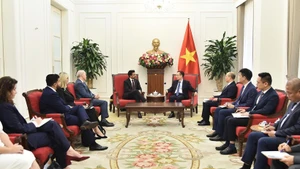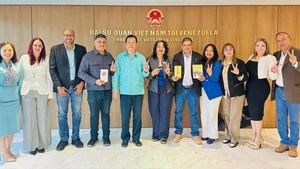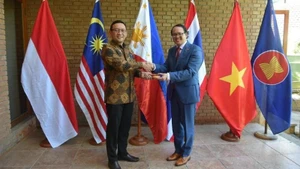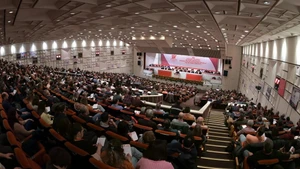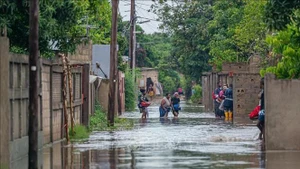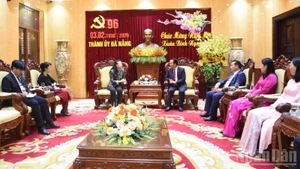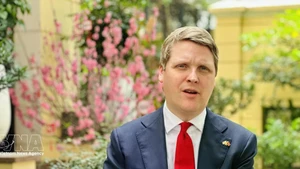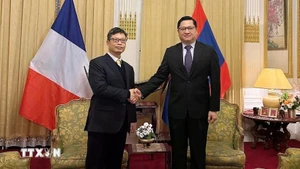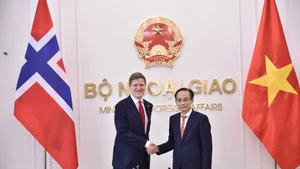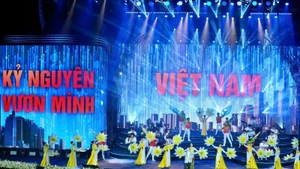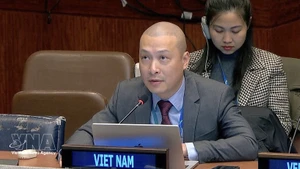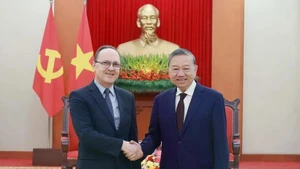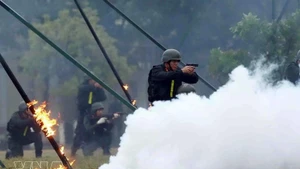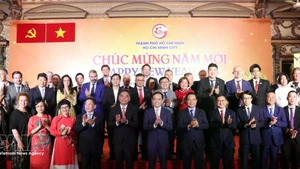The visit also contributes to achieving each country’s development goals for the happiness of their peoples, and for peace, stability, cooperation and development in the region and the world.
Despite the cold and rainy weather in Pyongyang in recent days, the reception for the Vietnamese delegation was organised in a solemn and thoughtful manner, ensuring the delegation’s schedule proceeded smoothly.
The DPRK was among the first countries in the world to establish diplomatic relations with Viet Nam in 1950. The traditional friendship between the two nations was nurtured by President Ho Chi Minh, President Kim Il Sung and successive generations of leaders from both countries.
The official welcoming ceremony for General Secretary To Lam and the high-level Vietnamese delegation, chaired by General Secretary of the Workers' Party of Korea and President of the State Affairs of the DPRK Kim Jong Un, took place in a warm and friendly atmosphere, attended by senior officials and large crowds of citizens of the DPRK. It was a moving and memorable moment as the people waved red flags with golden stars and cheered to welcome General Secretary of the Communist Party of Viet Nam Central Committee To Lam.
This marks General Secretary To Lam’s first visit to the DPRK in his capacity as Party leader, and the first State visit by a General Secretary of the Communist Party of Viet Nam to the DPRK in 18 years. The visit comes at a time when the two countries are celebrating the 75th anniversary of diplomatic relations (1950–2025), the Viet Nam–DPRK Friendship Year 2025. The visit reaffirms Viet Nam’s consistent foreign policy of valuing ties with its traditional friends.
The DPRK was among the first countries in the world to establish diplomatic relations with Viet Nam in 1950. The traditional friendship between the two nations was nurtured by President Ho Chi Minh, President Kim Il Sung and successive generations of leaders from both countries.
Over the years, the two sides have signed several bilateral cooperation agreements in areas such as culture, health, civil aviation, mutual legal assistance, investment promotion and protection, and double taxation avoidance. They have also maintained dialogue and cooperation mechanisms such as Deputy Foreign Minister-level Political Consultations and the Intergovernmental Committee for Economic, Trade, Scientific and Technical Cooperation, based on each country’s needs and in line with international regulations.
During the State-level talks, both leaders expressed satisfaction at the continued consolidation and strengthening of ties between the two Parties and countries. They agreed to advance Viet Nam–DPRK relations into a new, more practical and effective stage, contributing to each country’s development goals, the happiness of their peoples, and peace, stability and development in the region and the world.
General Secretary To Lam congratulated the DPRK on its remarkable achievements in national construction and development over the past 80 years, expressing his belief that, with the guiding principles of “putting the people at the centre”, “great unity” and “self-reliance”, the DPRK would accomplish the goals set by the Workers’ Party of Korea (WPK), ushering in a new era of comprehensive national prosperity.

Viet Nam stands ready to share its experience with the DPRK in economic reform, external economic affairs, and socio-economic management policies, while expressing the wish to expand cooperation in areas of mutual strength such as culture, sports, tourism, education, health, information and communications. Both sides also aim to develop broadcasting and television programmes to promote the culture, country and people of each nation.
General Secretary of the WPK and President of the State Affairs of the DPRK Kim Jong Un highly valued Viet Nam’s cooperation proposals, affirming that the DPRK wishes to work closely with Viet Nam in Party building and national development, and is ready to foster cooperation across suitable sectors. He urged Party and Foreign Ministry agencies as well as ministries, sectors and localities of both sides to enhance exchanges and devise concrete measures to effectively implement major orientations for developing bilateral ties, thus bringing Viet Nam–DPRK relations into a new phase that delivers tangible benefits to both peoples.
General Secretary To Lam congratulated the DPRK on its remarkable achievements in national construction and development over the past 80 years, expressing his belief that, with the guiding principles of “putting the people at the centre”, “great unity” and “self-reliance”, the DPRK would accomplish the goals set by the Workers’ Party of Korea (WPK), ushering in a new era of comprehensive national prosperity.
As part of the visit, the Vietnamese delegation attended an art performance marking the 80th founding anniversary of the Workers’ Party of Korea. The elaborate collective performances, set to stirring revolutionary music and warmly applauded by the audience, provided deeper insight into the source of strength, determination and resilience of the DPRK’s Party, State and people in their efforts to safeguard, build and develop the nation. That same atmosphere carried over into the military parade celebrating the Party’s 80th anniversary (October 10, 1945 – October 10, 2025). Despite the heavy rain and cold night, Kim Il Sung Square was packed with participants, filled with excitement, faith and pride.

During a visit to the Juche-oriented Musical Art Museum in Pyongyang, General Secretary To Lam expressed admiration for the deep musical understanding, talent and cultural commitment of the DPRK’s leadership. He emphasised that culture and music are sources of strength that can overcome all difficulties, and that every citizen has the right to enjoy them.
Over the past five years, the DPRK has pursued a national economic development plan aimed at building a stable, self-reliant economy. It has focused on developing metallurgy and chemical industries, modernising agriculture, and addressing key social issues such as housing and food security.
The DPRK is implementing its “20x10 Local Development Policy”, which aims to build 20 modern factories annually across localities over a 10-year period, in order to narrow regional development gaps. The initial phase prioritises light industries such as garment production, food processing and consumer goods, followed by expansion into healthcare, education, science and technology, aquaculture and food management. The government is also pushing ahead with the construction of 50,000 housing units in Pyongyang between 2021 and 2025 (10,000 per year on average).
The final stage of this housing project, 10,000 units in Hwasong District, began in February 2025 and is expected to be completed by year’s end. The DPRK attaches great importance to education, having built a comprehensive system from preschool to adult learning. Its schools are well-equipped, harmoniously designed with their surroundings, and provide pupils with well-rounded development in knowledge, physical health and spiritual life.
This could be clearly seen during a visit to Kyongsang Kindergarten, a music training institution for gifted children. Many of its students have achieved outstanding results in international competitions, while most teachers have around 40 years of experience and are tasked with discovering musical talents at other institutions.
Watching the children’s lively performances, including the Vietnamese song "Who loves Uncle Ho Chi Minh more than Vietnamese children do?" by composer Phong Nha - one could feel their joy and enthusiasm. Many schools, particularly at primary level, are also intensifying the use of information technology in teaching and learning, and digitalising educational resources.
According to Vietnamese Ambassador to the DPRK Le Ba Vinh, cultural and people-to-people exchanges are highlights of the friendship between the two nations, with diverse forms of cooperation such as art and cultural delegations, sports exchanges, participation in the annual Spring Art Festival, and the Pyongyang International Film Festival.
People-to-people exchanges have been maintained and expanded, especially within the framework of the Viet Nam–DPRK Friendship Year 2025. These activities help deepen mutual understanding and appreciation of the traditional and friendly ties between the two Parties, States and peoples. Agricultural cooperation has also been a bright spot, with many practical and effective initiatives.
During this visit, General Secretary To Lam and General Secretary of the Workers' Party of Korea and President of the State Affairs of the DPRK Kim Jong Un agreed to enhance exchanges of high-level and other-level delegations across Party, State, Government, National Assembly and local channels, to strengthen experience-sharing, political trust and mutual understanding. They also agreed to effectively maintain dialogue and cooperation mechanisms, explore potential cooperation fields, and promote people-to-people exchanges to further tighten the bonds of friendship between the two nations.
The signing of several cooperation documents between ministries and agencies marks a new, important step in the traditional friendship between Viet Nam and the DPRK, further contributing to each nation’s development goals and to peace and progress in the region and the world.

